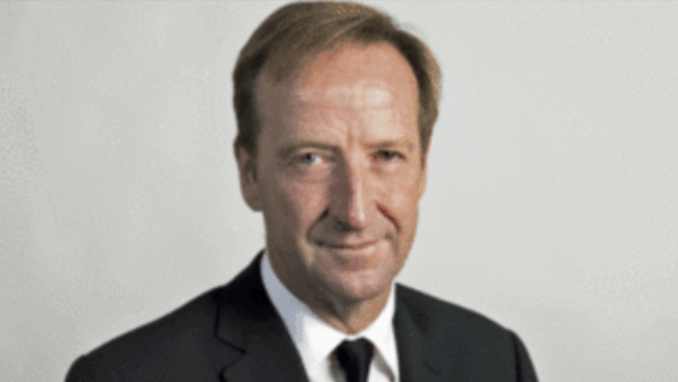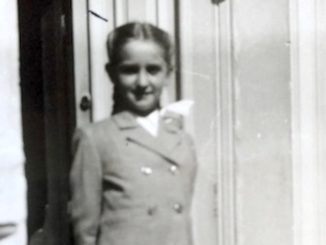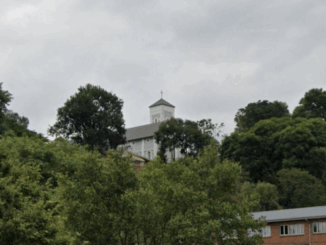
Alex Younger – intelligence officer,
UK Government – Open Government Licence
A friend tells me that during their first interview, a candidate for the Intelligence Branch of the Secret Intelligence Service (MI6) is informed the job involves ‘getting the hang’ of people of interest. The hopeful would-be spy is invited to create, in their own words, a pen portrait of an intriguing individual they know.
Lesser mortals, destined for the pen-pushing and bag-carrying Executive Branch, are merely required to prove they can live on a pittance in central London and will tap thier noses when others might be tempted to move their lips.
For clarity, MI5 is tasked with the defence of the realm, whereas the role of MI6 is to further national self-interest beyond Crown territory.
We shall apply G-P’s pen portrait-providing powers to a mainstream media sofa-dweller who did a round of the studios during a recent embarrassment of a state visit starring President of the French Republic, Emmanuel Jean-Michel Frédéric Macron.
The chap in question is Sir Alex Younger, interviewed on last Thursday’s Newsnight by anchor Paddy O’Connell. Newsnight Queen Bee Victoria Derbyshire doesn’t do Thursdays or Fridays in nice weather. A tall, quietly spoken Home Counties Scotsman, with an open collar and penetrating stare, Sir Alex was introduced as not only he who ran MI6 but was the intelligence services’ longest-serving chief for 50 years.
As he spoke, the sandy-haired 62-year-old painted a portrait resplendent with the usual baddie bullet points made flesh: Putin, the Chinese, Iranian proxies. But what pencil-line impression would emerge if we were to put a candle beneath the invisible ink and self-destructing paper to reveal a getting-the-hang-of Sir Alex?
Born on the 4th July 1963 in Westminster, Sir Alex is both a contemporary of myself (October ’62) and of my fellow Cumbrian, the interesting Richard Tomlinson (January 1963). A Barnard Castle School former pupil, an Old Barnardian, Tomlinson joined the SIS in 1991.
After not fitting in, he left the Service. Despite being set up in a career in financial services by his onetime employers, he bore a grudge that culminated in a tell-all book entitled The Big Breach – Inside the Secret World of MI6. This was published in Russia in 2001 by Serge Korovin.
Another friend tells me that in the book Sir Alex Younger appears as ‘Spencer’, as Tomlinson and Younger were part of the same intelligence officers’ entry group. The Russians play a long, crafty and dirty game. At the time of its appearance, ten years into Younger’s service, and with him already being marked as a potential high-flyer, Big Breach does what it can to show ‘Spencer’ in a disparaging light.
Late and last to arrive on induction day, Spencer shuffles and glances shiftily. He is cheeky, forgetful, and keeps the rain away with a Burberry umbrella. On exercise, he fails to complete a task after getting drunk in a Portsmouth pub rather than hoovering up personal information from unsuspecting members of the public. During a practice clandestine drop, other than hand Tomlinson an inconspicuous plain envelope or roll of film, he passes a giant coloured ice cream – to the delight of other branches of the Service practising their watching.
Tomlinson gets his revenge by leaving a loaded mousetrap in his contemporaries’ dead letter box behind a church statue. As an unconvincing jobbing builder, Spencer fails to relieve the plans for a pretend terrorist hideout from a suspicious Town Clerk’s office. On a more serious note, Tomlinson gives away Spencer’s real name. During an exercise on maintaining cover in a social situation awash with alcohol, for once Spencer is called by the first name of Alex and drinks a tin of Wm Younger’s beer.
As well Sir Alex might. In all efficient besmirching of character, there must be a grain of truth. Given the fuller picture, it would not be surprising if Alex Younger were to approach the early parts of his service with a degree of relaxed entitlement.
For Alex is a member of the Younger brewing dynasty, which evolved from minor gentry to trade to near nobility as the Edinburgh brewers of that name. Established in 1749, the family firm eventually dominated the Scottish brewing industry through a merger with McEwan’s en route to becoming the international hospitality conglomerate, Scottish and Newcastle.
Sir Alex Younger’s parents were Nicholas Roland Edge Younger and Mary Patricia Flemming Edge, a major-general’s daughter. Grandfather was Major Henry Johnston Younger, who served with the Highland Light Infantry in the First War. After a break in civvy street in the family business, in the Second War he rose to be a lieutenant-colonel in the Territorial Army’s Lothians and Border Horse, a mechanised yeomanry unit. Major Younger fell at St Valery-en-Caux on 12th June 1940 and lies in the St Valery-en-Caux Franco-British Cemetery.
Great-grandfather was Lt-Col William Johnston Younger, whose seat was Harmeny, Balerno, Midlothian. Built as a country house, in 1906 this was remodelled for the colonel by Sir Robert Lorimer. Later, it became a residential school run by Save the Children. Politics also features. Mrs Thatcher’s former Secretary of State for Scotland and Secretary of State for Defence, George Younger, was a relative.
Despite father and grandfather being old boys of Winchester College, Alex attended Marlborough – alma mater of Princess Eugenie and the Princess of Wales – before Army sponsorship saw him through St Andrews from where he graduating in Economics.
Commissioned into the Royal Scots in September 1986 as a second lieutenant (on probation), he transferred to the Scots Guards later that year. Promoted to captain in April 1989, the following year he transferred to the Regular Reserve of Officers, thereby ending his active military service.
According to Tomlinson, Younger referred to his time in the Army as kicking about in the Scots Guards for a bit while not knowing what to do. Also according to Tomlinson, Younger went from the Army to the HALO Trust, a landmine-clearing NGO, in Afghanistan. It was there he received a tap on the shoulder from the SIS.
At the end of the intelligence officers’ entry course, Younger is awarded a Box 2, meaning above average. Tomlinson awards himself a Box 1, outstanding. From there, Younger is posted to what Tomlinson calls the ‘Eastern Europe Controllerate’. By this, I suspect, but I may be wrong, he means an East European ‘station’ – probably located in Vienna – coordinating with an East European ‘desk’ back in London. The focus being on people of interest in the West with relatives in high places in the East. These significant sources were becoming easier to cultivate as the Cold War came to an end.
When head of the Service, Younger’s gov.uk biography was brief: ‘Alex Younger is the Chief of the Secret Intelligence Service (known as MI6). He was appointed in November 2014. He is a career MI6 officer and has been in the Service since 1991.’
From elsewhere, we read that Younger served in the Balkans during the Yugoslav civil war, and in Vienna, Dubai and Afghanistan, where he oversaw all SIS operations in the country. He became Head of Counter-Terrorism in the UK in 2009, one of the responsibilities being security for the 2012 London Olympics.
Rising to Deputy Director in 2012, he was nominated Chief in October 2014 when he succeeded the retiring Sir John Sawers. As for being the longest-serving spy chief for 50 years, the expected four or five-year term was extended to 2020 to cover the post-Leave negotiations with the EU.
Away from the Great Game, tragedy struck in March 2019 when 22-year-old son Sam died in a motoring accident on a private estate in Stirlingshire. He is survived by an older sister and younger brother.
Back in the modern day, Alex fell into conversation with Newsnight‘s Paddy and a bedwetting Remainer called Miss Georgina Wright who represents a thing called ‘The German Marshall Fund’. Putin undermines premises, stated Sir Alex, and eyes Latvia. Putin’s premises in Ukraine are rubbish. NATO and the EU wouldn’t dream of extending east. Untrue.
Since the end of the Cold War, NATO and the EU have extended from a line between Stettin and Trieste all the way to the border between Poland and Ukraine. Stalling only with the unsuccessful Euromaidan landgrab in Ukraine in 2014. This was followed seven years later by a now forgotten push to overthrow the election results in Belarus. The unsuccessful attempt at a Minsk ‘coloured’ style revolution being fronted by the cringingly Western media-oriented Maria Kolesnikova.
Incidentally, Sir Alex’s time as head of SIS coincided with rotters such as the Chinese and Russians being encouraged to flood London with money.
Regarding French/British nuclear co-operation, the French deterrent is independent with, according to Sir Alex, our launch sequence for Trident being truly independent. An odd choice of words. Perhaps trying to disguise the suspicion that if the Americans won’t let us use Storm Shadow without permission, then they won’t let us use Trident either.
America cannot police the world; we have to do some of this ourselves. The arguments surrounding Brexit were narcissistic. The interviewer intervened to suggest the Chinese and Russians love it when we use our free speech to slag each other off, as if, to the BBC, free expression is some kind of disability. What’s frightening to our enemies, countered Sir Alex, is the quality of the West’s teamwork and alliances.
Our co-operation is something authoritarian regimes can’t compete with. The counterargument being a lack of enthusiasm from the likes of Turkey, Hungary, Slovakia and others towards an anti-Russian coalition. Putin conjures into reality a world that was a lie and is now the truth. Putin misjudges. All he can do is play Donald Trump like a musical instrument.
On the small boats, mass uncontrolled illegal immigration isn’t an intelligence issue, but more one of ‘societal acceptance’. Uttered close to the anniversary of the 7/7 London bombings (perpetrated by three Pakistanis and a West Indian), the former MI6 chief’s dishonesty is unpleasant.
This month also sees the anniversaries of the Glasgow Airport attack (an Iraqi and an Indian brought up in Saudi Arabia) and the Southport murders carried out by a Rwandan. Never mind, according to Sir Alex, such things can be addressed by giving everyone a ‘digital identity’.
Moving on to Iran, the regime is fighting for its life. Its proxies in Palestine, South Lebanon and elsewhere are on their backs. Quoting the dinner party gossip in one or two Tehran subdivisions while ignoring the other 95,000,000 of them, Sir Alex references a majority in Iran who think their nuclear programme a liability.
More sensibly, the Ayatollahs’ present difficulties are an opportunity to negotiate an end to nuclear proliferation rather than to force regime change. As for the threat on the streets of London from Iran and its proxies, nobody in mainstream media ever asks the key question. Why is the bullet-magnet Iranian opposition, and the associated propaganda warfare effort against Tehran, based here? Puffins already know.
Which brings us to the nub of the issue. We could write a doctoral thesis (or three) on the subject, but instead will use our newfound powers of pencil portraiture to keep it snappy:
When the Secret Intelligence Service talks about protecting the national interest, does it mean the well-being of all British citizens — or is it really serving the interests of a London elite, who have themselves vested their self-interest in foreign powers?
© Always Worth Saying 2025



